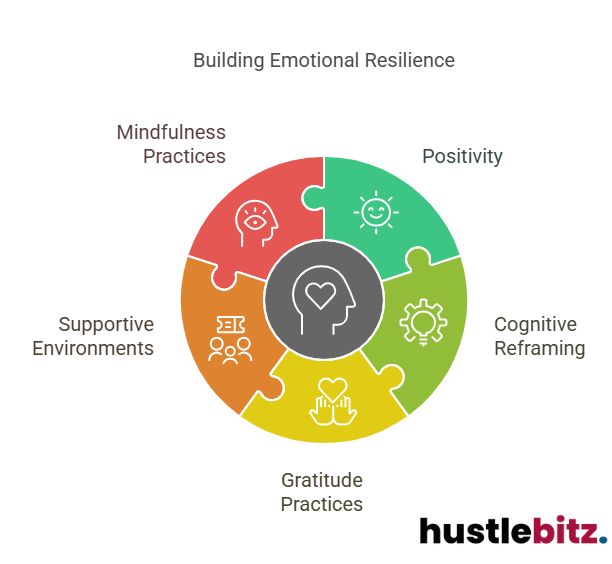Positivity is fundamental in healing mental health challenges, as it enhances emotional resilience and overall well-being. Techniques such as cognitive reframing transform negative thoughts into constructive ones, alleviating anxiety and depression. Practices like gratitude journaling and mindfulness foster a positive mindset, shifting focus from scarcity to abundance. Furthermore, robust social support networks can buffer against stress, promoting a sense of belonging and encouragement. Cultivating hope through attainable goals also aids resilience, empowering individuals to confront and navigate life’s challenges. Understanding the multifaceted role of positivity can yield profound insights into the journey of mental health recovery and growth.
Key Takeaways
- Positivity enhances emotional resilience, helping individuals cope better with mental health challenges like anxiety and depression.
- Cognitive reframing techniques transform negative thoughts into constructive perspectives, reducing emotional distress and promoting healing.
- Gratitude practices shift focus towards abundance, improving mood and fostering emotional well-being.
- Supportive environments and strong social connections provide essential emotional resources, buffering against stress and encouraging resilience.
- Mindfulness practices cultivate present-moment awareness, enhancing coping mechanisms and contributing to a positive mindset.

Understanding Mental Health Challenges
Mental health challenges encompass a wide range of conditions that affect an individual’s emotional, psychological, and social well-being, influencing how they think, feel, and interact with others. These challenges can manifest as mental illnesses, such as anxiety disorders, depression, and schizophrenia, each presenting unique emotional struggles for those affected. Understanding these conditions is crucial for fostering empathy and effective support.
Coping mechanisms are vital for managing mental health challenges. Individuals often employ various strategies, such as mindfulness, exercise, and social engagement, to navigate their emotional struggles. However, the effectiveness of these mechanisms can vary greatly among individuals, making personalized approaches essential.
Therapy options, ranging from cognitive-behavioral therapy to medication management, play a significant role in helping those with mental illnesses develop healthier coping strategies.
Despite increasing awareness, stigma surrounding mental health remains a significant barrier to treatment. Many individuals fear judgment or discrimination, which can deter them from seeking help.
Stigma reduction is imperative for creating a supportive environment that encourages open discussions about mental health, enabling individuals to access the resources and therapy options they need.
Impact of Positivity in Mental Health

The influence of positivity on mental health can significantly enhance emotional resilience and overall well-being. Engaging in practices such as cognitive reframing techniques allows individuals to reinterpret negative thoughts, fostering a more optimistic outlook. This shift in perspective can help mitigate symptoms of anxiety and depression, leading to a healthier mental state.
Positive affirmation practices play a crucial role in reinforcing self-worth and confidence. By regularly affirming personal strengths and capabilities, individuals can cultivate a more proactive approach to challenges, which contributes positively to their mental health.
Additionally, the presence of robust social support networks is vital; connections with friends, family, and community members provide emotional resources that buffer against stress and promote healing.
Mindfulness meditation benefits should not be overlooked, as this practice encourages present-moment awareness and acceptance. Through mindfulness, individuals can develop emotional regulation strategies that enable them to manage their reactions to stressors more effectively.
This heightened awareness can lead to decreased rumination and improved coping mechanisms.
Benefits of a Positive Mindset
A positive mindset fosters resilience and enhances overall well-being, enabling individuals to navigate life’s challenges with greater ease and optimism. Through intentional mindset shifts, individuals can cultivate emotional resilience, which is crucial in managing stress and adversity. This shift in perspective not only helps individuals face difficulties but also promotes a healthier response to stressors.
Cognitive reframing is a powerful tool that accompanies a positive mindset. By changing the way we interpret our experiences, we can transform negative thoughts into constructive ones. This process allows individuals to view setbacks as opportunities for growth rather than insurmountable obstacles, thereby reducing the emotional weight of challenging situations. Such cognitive strategies contribute significantly to stress reduction, as they empower individuals to take control of their thoughts and feelings.
Incorporating wellness strategies that emphasize positivity can lead to profound improvements in mental health. Practices such as mindfulness, positive self-talk, and visualization techniques can enhance emotional well-being and create a more optimistic outlook on life. These strategies not only bolster resilience but also increase overall life satisfaction.
Ultimately, the benefits of a positive mindset extend beyond personal growth; they influence relationships, productivity, and health outcomes. By fostering a culture of positivity, individuals can create supportive environments that encourage resilience and well-being, leading to a more fulfilling life. Embracing a positive mindset is not merely a choice; it is a transformative journey that nurtures emotional strength and enhances quality of life.
The Power of Gratitude

Cultivating a positive mindset naturally leads to the recognition and appreciation of gratitude, which plays a vital role in enhancing emotional well-being and fostering resilience.
Gratitude serves as a powerful tool for mental health, helping individuals shift their focus from what they lack to what they possess. Engaging in gratitude practices can significantly improve one’s overall mood and outlook on life.
One effective method is gratitude journaling, where individuals regularly record things they are thankful for. This practice encourages reflection and helps to solidify the positive experiences within one’s memory.
Similarly, thankfulness exercises, such as writing thank-you notes or expressing appreciation verbally, can enhance social connections and emotional support.
Incorporating appreciation practices into daily routines fosters a culture of positivity. Activities like gratitude visualization—imagining moments of joy and fulfillment—can evoke feelings of happiness and contentment.
Additionally, kindness reflections encourage individuals to contemplate acts of kindness they have both given and received, reinforcing the value of human connection.
Hope as a Healing Tool

Hope serves as a transformative healing tool, empowering individuals to navigate challenges and envision a brighter future. It plays a crucial role in mental health, serving as a catalyst for positive change.
Individuals who cultivate hope often engage in hope strategies, which include setting attainable goals and developing actionable plans to achieve them. These strategies foster a sense of direction and purpose, critical components in the healing journey.
Healing affirmations are another powerful aspect of nurturing hope. By reinforcing positive self-beliefs through daily affirmations, individuals can mitigate negative thoughts that hinder progress. This practice promotes an optimistic mindset, making it easier to cope with adversity. Optimism practices, such as focusing on potential outcomes rather than limitations, further bolster the healing process.
Creating supportive environments is equally essential in harnessing hope as a healing tool. Surrounding oneself with encouraging individuals can significantly enhance one’s ability to remain hopeful. Such environments foster open communication and emotional support, allowing individuals to share their experiences and challenges without fear of judgment.
Furthermore, hope is integral to resilience building. When individuals believe in the possibility of recovery and improvement, they are more likely to face setbacks with determination. This outlook not only aids in overcoming personal challenges but also inspires others within their community.
Ultimately, cultivating hope is essential for mental health, serving as a foundation for healing and personal growth.
Resilience Through Positive Thinking

Resilience is significantly enhanced through the practice of positive thinking, empowering individuals to navigate life’s challenges with a proactive and optimistic mindset. This approach fosters cognitive reframing, allowing individuals to reinterpret negative events in a more constructive light. By viewing setbacks as opportunities for growth, people can cultivate a stronger sense of resilience.
Positive thinking also plays a crucial role in emotional regulation. By focusing on positive outcomes and embracing a hopeful perspective, individuals can manage their emotional responses more effectively. This regulation not only reduces stress but also enhances overall well-being, making it easier to confront adversity.
Creating supportive environments is vital for nurturing resilience through positivity. When individuals are surrounded by encouraging friends, family, and colleagues, they are more likely to adopt a positive mindset. Supportive relationships provide a safety net that reinforces the belief in one’s ability to overcome difficulties.
Incorporating mindfulness practices is another essential strategy for building resilience. Mindfulness encourages individuals to stay present and cultivate awareness of their thoughts and feelings without judgment. This heightened awareness can facilitate a positive outlook and reduce anxiety, further enhancing resilience.
Lastly, fostering social connections is integral to positive thinking and resilience. Engaging with a network of supportive individuals not only provides encouragement but also promotes a shared sense of purpose. Together, these elements create a robust framework for resilience, demonstrating that positive thinking is not merely an optimistic outlook but a powerful tool for healing and growth.
Final Thoughts
Positivity is a powerful force in the journey of mental health healing, offering tools that can reshape perspectives and build resilience. Through techniques like cognitive reframing, mindfulness, gratitude, and social support, individuals can foster emotional well-being and overcome challenges with renewed strength. Cultivating hope and optimism not only enhances personal growth but also creates a foundation for long-term mental health. By embracing positivity, individuals can transform adversity into opportunities for healing, fostering a sense of purpose and fulfillment on their path to recovery.




